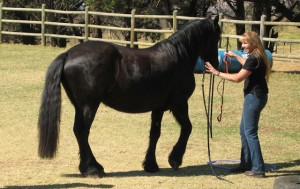I am a horsey person; and I come from a long line of horsey people. I ride as often as I can; and each time that I do I am inspired and amazed at the magnificence and humility of my horse. I often consider the fact that such a powerful animal concedes not only to let me lead him, but is gracious and patient enough to teach me not only about riding but also about myself. I honestly believe a horse mirrors and plays out for you what is really in your heart. So last week, when I was afforded an opportunity to do Horseplay with Carl Bronner in KwaZulu Natal I could hardly sleep with excitement.
Horseplay is a workshop devised by Carl Bronner, which essentially uses natural horsemanship techniques to teach us about communication, not just with horses but amongst ourselves in the workplace. You may be wondering what a day in a field with a bunch of horses could possibly teach you about communicating with your colleagues? Well, the similarities; and therefore the lessons that can be drawn, are startling. In order to practice natural horsemanship (which is basically training a horse without whips and chains) the focus for the person is on becoming aware of who you need to become as a person rather than on a method of training; and I think this is key in seeing the importance of horseplay and what it can teach us for the workplace. All my training at TomorrowToday has an overlay of self-understanding, raising one’s emotional intelligence, becoming aware of what one’s identity communicates, whether that is from a cultural, gender or generational perspective or whether that is influenced by where, with whom and in what department we work. This is why horseplay really makes sense to me for assisting us at work.
It is a fascinating and inspirational morning, all set in the surrounds of the magnificent KwaZulu Natal Midlands. Essentially what Carl teaches you is that horses are herd animals and pray animals. There is also a pecking order in the herd (which can change from day to day but generally stays pretty much the same) and that there is a dominant horse in the herd, which is usually a female, which is called a mare. This is not unlike the way a lot of workplaces are structured (although in truth the leader of the herd is usually male!). Carl takes you through a series of activities, which illustrate and highlight the importance of understanding a horse’s perception, which mirrors some of the lessons we need to learn in the workplace to understand different perspectives.
The other important thing that we learnt during horseplay was that these 700kg horses who had never met us before that day, could be communicated to; and asked to complete tasks (which they did for the most part) provided we communicated to them in a way that they understand. This meant that we had to adapt ourselves in order for them to understand what we wanted. This is something I communicate to people in my training all the time: if we are to connect with people, if we are to build relationships with people, we have to be open to adpating ourselves in order to best find ways for others, with different perspectives, to understand what we are asking. And in an ideal world, they would do the same.
Did you know that the number one reason why people leave their place of work is relationships? Not money, or working conditions, or work expectations or the amount of work, but simply relationships. So whether we don’t know how to communicate with somebody because the hierarchical gap is too great, or because they come from a different culture or generation to us, or because we don’t understand their personality type or because their world view seems so foreign to ours, perhaps we could start by learning how to communicate differently; and therefore learn to discover the similarities.
TomorrowToday offers training in the following spaces:
1) the Enneagram (personality types)
2) Gender, cultural and generational diversity
3) Mentorship and leadership
4) Raising self-awareness and emotional intelligence
all of which are hugely complimented by horseplay. Please do not think you have to be a horsey person to enjoy and benefit from horseplay. Carl has had people who have hardly ever see a real live horse attend horseplay; and by all accounts has had almost more success with them.
If you are serious about finding ways to work together amidst diversity in the workplace, finding better ways to lead in your organisations, retaining and attracting good talent or finding ways to inspire more productive working environments contact [email protected] to find out more about our collaboration with Carl and horseplay.



